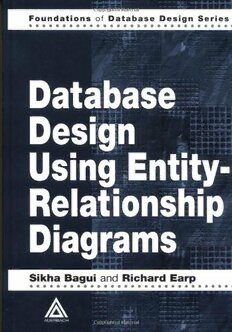
Database Design Using Entity-Relationship Diagrams PDF
321 Pages·2003·3.761 MB·English
Most books are stored in the elastic cloud where traffic is expensive. For this reason, we have a limit on daily download.
Preview Database Design Using Entity-Relationship Diagrams
Description:
Bagui and Earp's "Database Design Using Entity-Relationship Diagrams" is a very well written book. It's clear, concise, and well laid out. It also meets their intended audience and intent. From page xiii of the Preface:
"This book is intended to be used by database practitioners and students for data modeling. It is also intended to be used as a supplemental text in database courses, systems analysis and design courses, and other courses that design and implement databases."
And, from page xvii of the Introduction:
"This book was written to aid students in database classes and to help database practitioners in understanding how to arrive at a definite, clear database design using an entity relationship (ER) diagram."
The only reasons I give it a rating of four stars out of five instead of five stars out of five are purely a matter of taste. First, there's not a lot of breadth to this material. So, I'm not all that certain that a whole book is warranted (it really should be covered in full-fledged database books). Second, the majority of the book focuses on "Chen-like" ER diagrams because they are well-used and implementation independent (which is good reasoning). But, I'm pretty sure that most databases are relational nowadays, so more coverage in the vein of the last chapter (the Barker-like relational ER model) would be a good thing. If I could give the book four and one half stars, I would (it's really that good). But, since I can't, four stars will have to do. If you decide you really need a supplemental text in ER Diagrams, you can't go wrong with this book.
See more
The list of books you might like
Most books are stored in the elastic cloud where traffic is expensive. For this reason, we have a limit on daily download.
